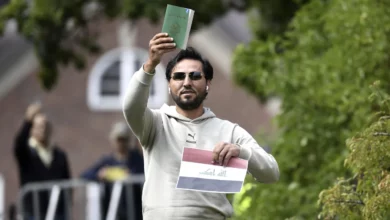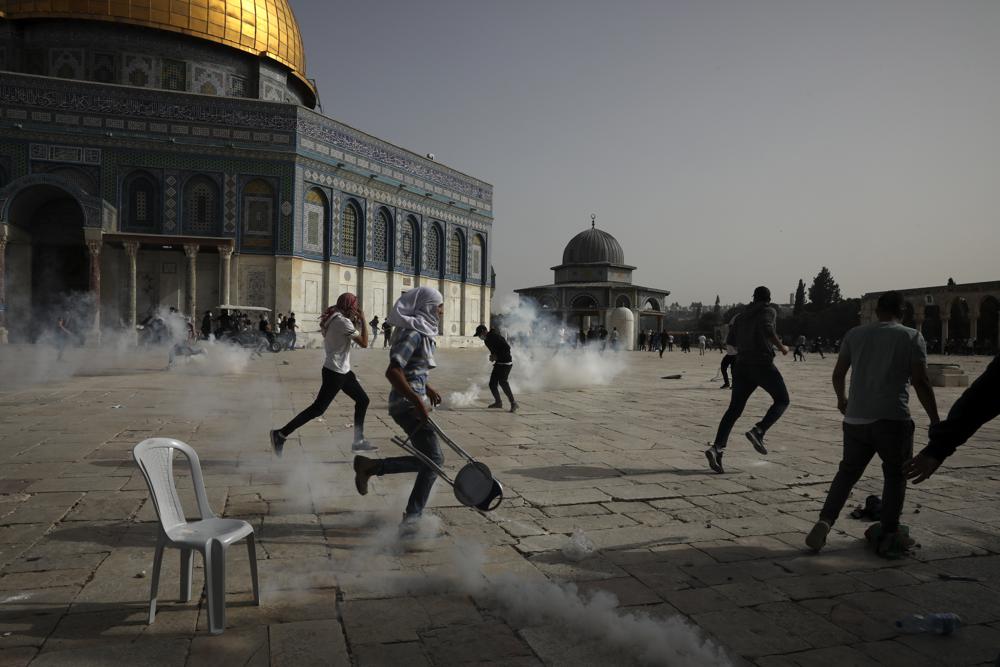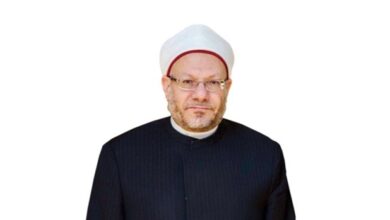The lights go down, and the audience falls quiet. But instead of actors taking their place on the stage in front of us, we hear a melody rising in the dark–a melody that is rarely heard in Europe, but which any resident of Egypt knows by heart.
The azan, or call to prayer, begins to echo around the room, rendered in three different ways by three very different voices. It is 8:30 PM. It is not time for prayer here in Brussels, though it may be somewhere else. But neither are these actors "pretending" to be someone they are not. The rest of the year, the men whose voices we hear, who stand in the room with us, call the faithful to prayer five times a day at different mosques around the city of Cairo.
Tonight, however, they are inviting us into Stefan Kaegi’s documentary theater-piece, of which they are at once the stars, and the co-authors: Radio Muezzin.
Opening the theater walls
Kaegi was born in Switzerland and now lives in Berlin. He works with the experimental theater collective Rimini Protokoll. Experimental theater collectives rarely attract much media attention or public acclaim, but Rimini Protokoll is a bit different. By making theater with "real people" in a way that undermines the very idea of specialized acting skills, or of any clear separation between the people on stage and those in the audience, they have garnered a reputation for themselves over the last decade that goes well beyond a narrow artistic coterie.
"I want to try and open the walls of the theater," says Kaegi, speaking by Skype from Berlin. "I want to make it a place where people meet, not a place of representation."
The result has been a series of shows in which the audience are able not only to watch and listen to, but also in many cases engage directly with, truck drivers, call center workers, medical students, gravestone makers, their elected representatives in the German parliament, and even (though in this case, somewhat against their will) the board of directors of the auto manufacturer Daimler Benz.
The nature of these real world relationships are often hidden in everyday life. But the space of the theater, once stripped of its less useful dramatic conventions, can help make them visible as never before. This is the whole point of Kaegi’s work. "I want to use the theater as a place where people who come from opposite ends of the globalization chain can meet. And I want to make this meeting a very direct experience."
Thus, in Cargo Sofia, the audience actually embarks in the back of a lorry driven by two Bulgarians, who use the journey to explain something about their own lives and work to their human "cargo." In Call Cutta, the "spectators" book a 60-minute mobile phone conversation with an operator in a call center in India. Instead of the Europeans buying something, or complaining about the poor service they have received from some company, it is the operators’ turn to tell them about their lives, and even give their "clients" tasks to perform.
Radio Muezzin comes from this tradition of theater which breaks the boundaries between journalism, performance, political action, and the visual arts. The idea for the show came to Kaegi while he was touring with Rimini Protokoll in the Middle East.
"I’d had an invitation from the Goethe Institute to make a new project in Cairo, but I was dubious as to whether it would work out. Then one day I found myself in Damascus, where you hear many beautiful voices calling the azan from many different mosques. Shortly afterwards, I was in Amman, and there there was only one voice, relayed throughout the whole city by radio. In Jordan, the azan had already been centralized."
When he came across an article which explained that centralization was about to be introduced in Egypt, too, he realized he had found his subject: "I couldn’t stop wondering what would happen to all the thousands of Egyptian muezzins who would lose their voice".
Thus the new project was born. Kaegi spent three months in Egypt putting the show together. An initial work-in-progress version was staged at El Sawy CultureWheel in Zamalek, in December 2008. Since then, the show has been touring Europe, with stops in Berlin, Zurich, Avignon and Dublin, along with many other destinations.
"In Cairo, people loved the idea of seeing their neighbors on stage!" Kaegi recalls. "But we also met people who were shocked by the idea of the muezzins talking, especially about religion. They told us we should have worked with imams instead!"
The baker and the electrician
The muezzins Kaegi brought together could not be more different, though most of them are from modest backgrounds. Hussein Gouda Hussein Badawi was born blind. (Up to the 1950s, muezzins were traditionally chosen from among the blind.) He works in a mosque in Zamalek, some two hours’ ride by microbus from his home in el-Nahda.
Abdel Moty Abdel Samia Ali Hindawi is an electrician by profession, and an "amateur" muezzin. He started going to the mosque to pass the time while convalescing from an accident, and soon found himself calling the azan whenever the regular muezzin was not there.
Mansour Abdel Salam Mansour Namous, on the other hand, has been an established employee of the Ministry of Awqaf (Religious Endowments), the body responsible for employing muezzins, for 13 years, but he still works shifts in his local bakery when he finishes at the mosque, in order to make ends meet.
The three muezzin share the stage with Sayed Abdel Latif Mohamed Hammad, an electrician and radio engineer, who helps explain the new technology which is due to be introduced by the Ministry of Awqaf later this year.
The men sit on simple chairs on a carpeted floor. Behind them, four video projection screens show still photos of their homes, or long tracking shots through the busy streets of Cairo. They explain their lives, work, and opinions, directly and simply to the audience. They describe their long journeys to work, their duties at the mosque. They mime for us the ablutions they perform, and the act of prayer (without actually washing or praying on stage). At other, more elaborately theatrical (and humorous) moments, they introduce us to the clocks that are used to determine the time of prayer for Muslims wherever they may be, from Alaska to Adelaide, or illustrate how dangerous a short-circuit can be.
The parts of their lives into which the muezzin invite us are not intensely psychological, but they are very real, and sometimes quite intimate. We learn how much, or how little, they earn. How much space they have to live in. What they think about religion, women, or the decree that will (for most of them) do away with their current jobs.
Rather than a lament a vanishing social institution, Radio Muezzin uses the differences between its protagonists to explore the complexity of contemporary Egyptian society. "It was an excuse for me to travel through the city," says Kaegi, "and to get to know all kinds of different neighbourhoods."
The absent sheikh
And with that diversity, came tensions, too, which the show seeks to make transparent, rather than conceal. Originally there were four muezzin on stage. However, one of them, Sheikh Mohamed Ali Mahmoud Farag, left the show last autumn, due to "conflicts" with the rest of the cast. In the version currently on tour, his words are spoken by assistant director Dia’deen Helmy Hamed, while Farag is shown in video recordings from previous performances.
"The expectations of someone who is a jet-set personality, and who makes money from real estate, were always going to be rather different from those of the other muezzin," Kaegi admits. "But still, I was disappointed by how little respect he had for the others."
While the other muezzin tell us about the accidents they had in the factories where they worked, or invite us into their modest two-room flats, the photos of Mohamed Ali show him in the company of kings, confidently boarding international flights, or winning prizes in international competitions in Quranic recitation.
The fact that he is also one of only thirty muezzin selected to recite the new centralized azan may not have been the main cause of the tension around him, but it couldn’t have helped.
"Strangely, the representation we have of him now in the work is very similar to what the people of Cairo will have later this year, when the centralization comes into force," Keagi says.
Radio Muezzin is not a nostalgic work, and nor are the muezzin themselves trapped in the past. Some regret the changes centralisation will bring to their own lives, while others are glad that the general quality of the azan will improve, and that they will be able to devote more time to their other tasks.
But the piece does give a very real insight into how religious institutions, social class and political processes intersect and influence one another in a contemporary Muslim state. And the lessons extend far beyond the banks of the Nile, or the particular dilemmas posed by a specific governmental decree.
"The people on the stage are not just there as individuals," Kaegi insists. "In a piece I did in Argentina, one of the performers, who was a doorman, said that he felt like an ambassador. He stood for himself, of course. But he also saw himself as representing all the doormen of Argentina, or even all the men of Latin America."
The Brussels show was the last of the present tour. But the show has been so successful, that the four remaining actors of Radio Muezzin will be returning to Europe later in 2010 to continue their embassy.




